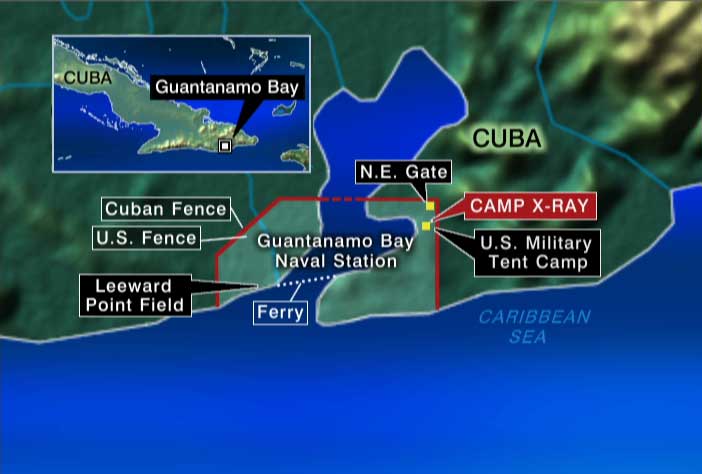

With the introduction of the situation at Guantánamo Bay as a parallel to the other perilous times we have studied throughout this unit, I was prompted to check the news for current information on the status of Guantánamo Bay. I found this article from The New York Times that discusses the supreme court ruling that the right "to challenge their detention in federal court." There are currently 255 detainees at Guantánamo in Cuba. Although it has now been four months since this ruling, and lawyers of most of the detainees have filed habeas corpus lawsuits, most cases have been delayed. The main hold up is over an arguement in the Justice Departmant over whether Federal Judges or Milatary Officals should have the power to decide the fate of these wartime detentions. The article says the camp is unlikely to close during the Bush administration. The trials are a long and slow process, and will mostly likely not be resolved until the next presidency.
I came across a very interesting statement regarding the evidence used for the trials regarding the detainees at Guantánamo. It closely parallels the evidence we have seen to be used in trials during other perilous times; "The government is relying extensively on classified information. That is quite likely to raise defense questions about how detainees can defend themselves since they are not permitted to see much of the evidence against them — long a contentious issue in the military’s hearings at Guantánamo Bay." The evidence being used against those being held prisoner is top secret and is too classified to be released for the trial. This resembles the situation with the trials during the Cold War where the "top secret" information was unable to be released in the trial, but was still able to be used against the defendant. Another similar situation is the "spectral evidence" used against the accused during the Salem Witch Trials. A reoccurring theme in times of peril seems to be the abuse of authority in the nation's court system. Evidence that would not usually be legitimate are accepted and used to convict those accused. Analysis of this reoccurring theme leads me to question the court system in times of peril: is it corrupt? Or rather, is it necessary to take such actions since it is a a time of peril?
NPR's take on the issue


1 comment:
This was definitely an interesting find Rachel! The first thing that came to my mind while reading the article was the Salem Witch Trials. Those accused at the time of the trials, had little to no power in the situation regarding their own lives. Many accused did indeed find out who turned them in, but were automatically labeled guilty. They weren't allowed to question or even stand up for themselves. The authority's power was able to expand past the point of human rights. So, I can't help but question the situation in which leaders can give themselves a bigger role. Were the Salem Witch Trials and Guantánamo Bay really times of crisis or just a period of peril? Is there a difference? It is definitely hard to draw the line, and determine when an authority figure can step over it.
Post a Comment